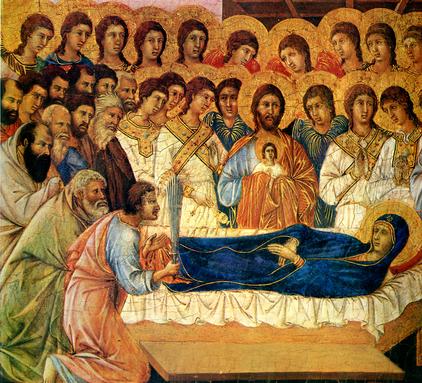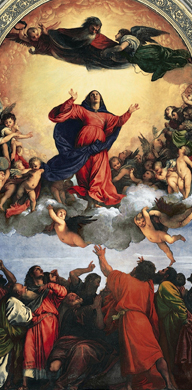For those of us who are Catholics, this celebration of Mary in heaven is so very natural. For those of us who are not Catholics, it might seem uncomfortable. There is always the question: "Aren't you raising Mary to the same level as Jesus?" Please bear with me, as I try to reflect upon what this feast can mean for all of us who believe in the saving power of Jesus' death, resurrection and gift of the Spirit, especially if I do so from my Roman Catholic enthusiasm and affection for Mary.
I think it has always been a mis-reading of the Catholic devotion to Mary, to see it as worship of Mary. I think one of the riches of the Christian spirit is to find every human, natural, tangible, emotional means available to support our faith. Down through history, as the form of the celebration of the Eucharist became more and more "distant" or "transcendent," I think the people used a variety of devotions to achieve an intimacy with our Lord. I believe that the Spirit keeps finding ways to inspire us with desires for intimacy with our God.

One of the very real human scenes that is wonderful to imagine is that time in the life of the early community, when Mary died. I have buried a number of very close relatives and I have a deep sense of what it is to say farewell to a loved one. Just imagine what a special person Mary was. Not only did she receive the extraordinary gift of conceiving and giving birth to Jesus, she raised him, and followed his public life. And, she was there at the foot of the cross, experienced him as alive in a new way, and was there on the day of Pentecost. Imagine the words exchanged between Mary and whatever disciples were around her as she approached her death. I remember vividly how my family caressed the body of my father and grandmother when they died. I can only imagine the very special devotion her friends and care givers had for her very special body at the time of her death.

As we reflect upon the meaning of the resurrection for us - as we do every time we celebrate a funeral - we are caught in the mystery of what happens to us after we die, after there is no more life in the body, when we pass into eternity and time is irrelevant. How does Christ's victory over sin and death touch and transform our mortal bodies? Part of why we pray for those who have died is to pray for God's mercy on our loved ones, in the faith-filled hope that God will forgive their sins and that "the angels will carry them to paradise." I imagine that it was easy for believers down through the centuries to be certain that Mary, of all people on this earth, the one "full of grace," would be the first to be carried home to the loving embrace of God. "The Assumption of the Blessed Virgin is a singular participation in her Son's Resurrection and an anticipation of the resurrection of other Christians." [Catechism of the Catholic Church, #966]
May Mary pray for us as we journey to eternity!
Hail, Mary, full of grace! The Lord is with you.
Blessed are you among women, and blessed is the fruit of your womb, Jesus!
Holy Mary, Mother of God, pray for us sinners,
now and at the hour of our death.
now and at the hour of our death.